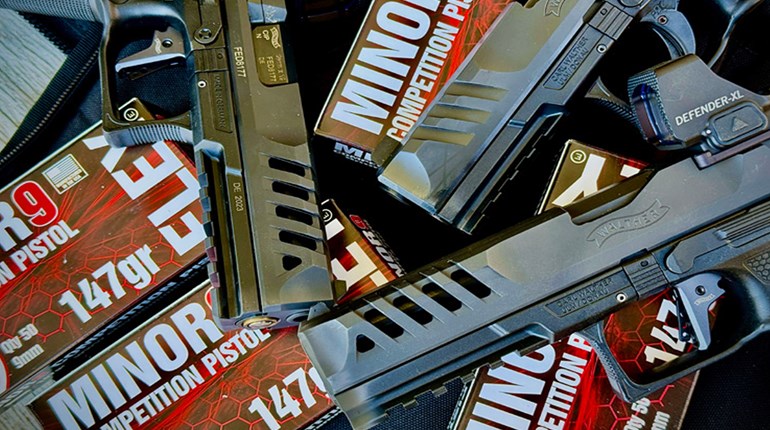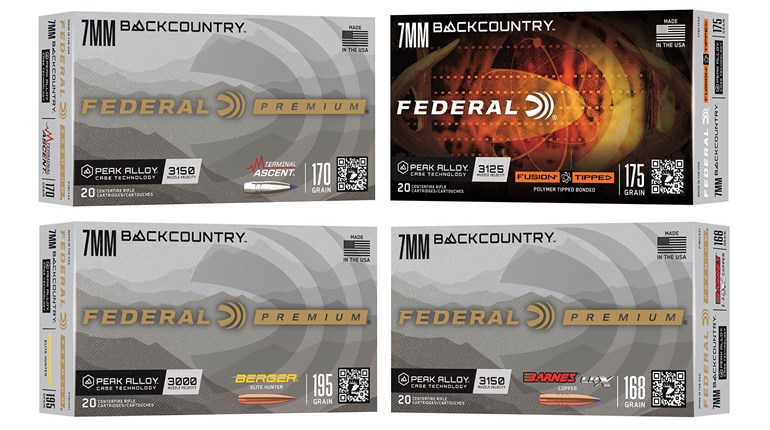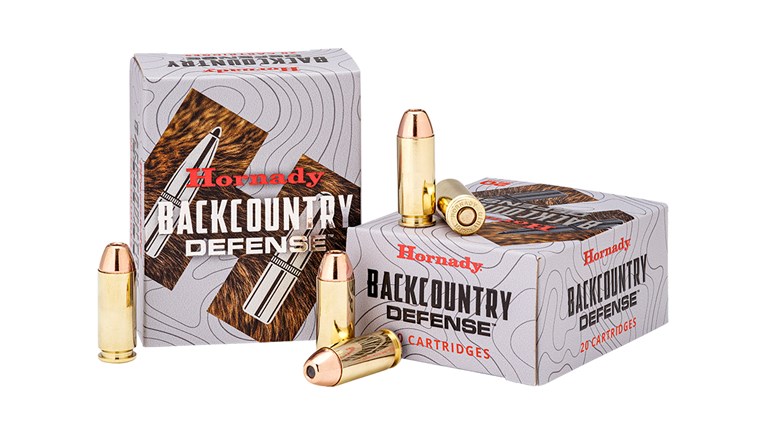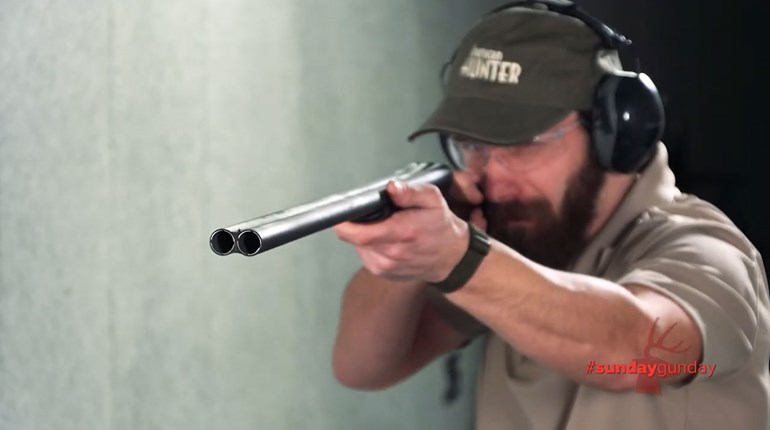
As a kid who poured over outdoor magazines in the late 20th century, I became sold on the notion that serious hunters only carried magnum rifles. The first centerfire gun I ever fired was a .300 Weatherby Magnum, a rifle my grandfather purchased for elk hunting. At 19 years old, I bought a .416 Remington Magnum under the flimsy pretense that if I owned a .416 I could use it for everything. The truth was magnums were cool and I wanted one.
I soon learned the reason the .416 was priced so affordably is that it battered the shooter with over 50 foot-pounds of recoil. At 19, I was willing to take that kind of abuse, but now that I’m firmly middle-aged with more experience in the field and less tolerance for recoil, the .416 remains tucked in the back of the gun safe for most of the year. Instead, I carry guns that are lighter, more accurate and more fun to shoot. And none of them are magnums.
What I’ve learned over the last couple decades is that mild non-magnum hunting rounds are not only comfortable to shoot, but many of them are also very effective. Your odds of quickly dispatching game improve when you’re shooting a rifle which you can handle comfortably, even if it isn’t chambered for a cartridge that produces the same eyebrow-raising ballistics as one of the hot magnums.
If you’re tired of added gun weight, extra kick, increased muzzle blast and more expensive ammunition, then it might be time to turn away from your magnum round. All the rounds listed below produce a maximum of 12 pounds of recoil energy in average-weight hunting rifles, which is less than the average .270 Winchester (17 pounds) and the .30-06 Springfield and 7mm Remington Magnum (20 pounds each). These light-recoil rounds have proven that you can have excellent field performance without the added punishment.

1. 6mm Creedmoor: The 6mm Creedmoor’s big brother, the 6.5 Creedmoor, is noticeably absent from this list. That’s only because of the two cartridges I think that the 6mm Creedmoor—which is based on a necked-down 6.5—is the more versatile of the two. The 6mm Creedmoor, like other long-range 6mm cartridges, produces minimal recoil and allows competitive long-range shooters to call their own shots. There are a variety of factory match ammunition offerings for the 6mm Creedmoor, but there are also varmint and big-game loads as well.

Hornady’s 103-grain ELD-X Precision Hunter load shoots flatter than the 6.5 Creedmoor, produces less recoil and carries about 1,100 ft.-lbs. of energy at 500 yards, and it’s just one of the great six Creedmoor offerings available. My own 6mm Creedmoor rifle is an E.R. Shaw with a Trijicon Huron scope, and I used that rifle to take a heavy-bodied Saskatchewan buck that managed just two steps after the bullet struck before it fell over. The Creedmoor is a killer, but recoil is very mild. It's also a great option if you’re searching for a light mountain rifle or a low-recoil starter gun for kids or new hunters.
Rifle Option: Springfield Armory got everything right with their Model 2020 Waypoint rifle, and the 6mm Creedmoor version weighs under 7 pounds and shoots tight groups, making it an ideal dual-purpose target and hunting rig.

2. .25-06 Remington: Adolph Niedner necked down the .30-06 Springfield case to hold .257-inch bullets in the 1920s, but it wasn’t until 1969 that Remington legitimized that wildcat cartridge as the .25-06 Remington. The cartridge found favor with hunters who wanted a single rifle for shooting everything from varmints to deer and even elk. When loaded with 100-grain Nosler Ballistic Tip ammo, at 3,220 fps the .25-06 hits just 5.9-inches low at 300 yards (when zeroed at 200 yards), and that makes shooting in open country easier. It’s no wonder famed Wyoming gun writer and hunter Bob Milek championed this cartridge. He appreciated the .25-06’s flat trajectory and mild recoil, and he found it to be an efficient killer.
I must agree. Years ago, a friend of mine drew a Shiras moose tag in Idaho, and I questioned his decision to carry a .25-06 on that hunt. A few days later he killed his bull with a single 120-grain Partition bullet. Upon impact, the bull tensed, took three steps forward and dropped. I witnessed very similar performance when my friend and fellow outdoor writer David Draper shot a big aoudad ram across a windy canyon with the .25-06. The .25-06 is light for elk and moose (although it has accounted for several of each), but for hogs, sheep, deer and antelope it’s darn near perfect. It’s also a great gun for predators and varmints, and its modest recoil (about 12 pounds in an average weight sporter rifle) makes it a superb option even for new shooters.
Rifle Option: Mossberg’s Patriot bolt-action is an affordable, accurate rifle that’s chambered in .25-06. With a good scope and quality ammunition, the setup is well-suited for most North American game.

3. 7mm-08 Remington: The success of the various 6.5s has certainly cut into the 7mm-08’s popularity, but that doesn’t change the fact that the 7mm-08 is a superb all-around hunting cartridge. It shoots flatter and produces less recoil than the .308 Winchester upon which it’s based, and because it will fit in a short action, it’s a great choice for lightweight mountain rifles. It’ll propel a 150-grain bullet to around 2800 fps, carrying more than 1,500 ft.-lbs. of energy at 400 yards. Performance on game is similar to the hotter 7mms without the recoil, muzzle blast, added gun weight and powder consumption. I know of two hunters who have used the cartridge successfully on eland in Africa, which can weigh up to a ton, and the 7mm-08 makes a fine elk cartridge. In fact, short of dangerous game, there’s very little North American game that the 7mm-08 can’t handle. Even in relatively light rifles, it produces about 12 pounds of recoil energy, which is about 40 percent less than the 7mm Remington Magnum. Most hunters can learn to shoot the 7mm-08 well, and that’s one reason this cartridge has earned a reputation as an efficient killer.
Rifle Option: Kimber’s excellent Hunter rifle in 7mm-08 Remington weighs under 6 pounds and costs around $1,000, making it a great choice.

4. .300 HAM’R: The .300 HAM’R gets my vote as the most underrated hunting cartridge on the market today. The HAM’R is the handiwork of gun maker Bill Wilson, and although Bill might best be known for producing custom 1911 pistols, his real passion is hunting feral hogs. Thoroughly unimpressed with the ballistics of the .300 Blackout, Wilson wanted to build a .30-caliber cartridge that would function in his AR-15 rifles reliably and offer the power needed to cleanly kill pigs. When he couldn’t find what he wanted, he designed it, and that’s how the .300 HAM’R came to pass.
The .300 HAM’R will push a 150 Hornady SST bullet at 2290 fps, which beats the .300 Blackout’s 1900 fps velocity with that bullet. In fact, the .300 HAM’R is nipping the heels of the .308 Winchester, but it can be built in lighter rifles and produces less recoil. During testing, Bill killed over 1,000 feral hogs with the HAM’R, and while I’ve only killed two pigs with it, the results were pretty spectacular. Both hogs I shot fell where they were standing and never moved again.

The .300 HAM’R was originally designed for AR rifles, but with Wilson Combat’s acquisition of New Ultra Light Arms means we’ll likely see NULA bolt-actions chambered in .300 HAM’R and weighing in at less than 5 pounds, which would make a great all-around lightweight hunting rifle that produced scant recoil.
Rifle Option: Hunters are eagerly awaiting the Ultra Light Arms .300 HAM’R bolt gun, but the Wilson Combat Tactical Hunter .300 HAM’R I used to kill those Texas hogs was extraordinarily accurate and extremely well-built. If you want an all-purpose hunting AR, there’s simply no better option.

5. .30-30 Winchester: The .30-30 Winchester first arrived on the scene in 1895, so to say this cartridge is old is an understatement. However, the .30-30 has managed to hang on and despite a century of competition form newer cartridges it remains one of the top-selling rounds in America. In fact, during the COVID-19 ammunition purchasing chaos, .30-30 ammo was the second round to disappear off store shelves at my local gun shop, preceded only by 5.56/.223. Millions of .30-30 rifles have been produced and sold, and countless heads of game have fallen to this round.
The .30-30 claims all this despite ballistics that are unimpressive by today’s standards. The round will push a 150-grain bullet about 2400 fps, and a 170-grain bullet at around 2,200 fps. Because most .30-30 rifles are lever guns with tubular magazines, there are very few pointed bullet options (save the Hornady LeveRevolution) which doesn’t help improve terminal performance.
With anemic ballistics and a century-old design, why would anyone carry a .30-30? For starters, while the .30-30 doesn’t impress on paper, it does a very good job of killing deer-sized game at moderate ranges. Thirty-thirty lever guns are short enough to be mobile in a deer blind or in dense woods, and these fast-handling firearms are perfect for tracking and still hunting. The .30-30 dumps hogs with authority, and a sleek lever gun allows for fast follow-ups. With modern ammunition—like Hornady’s LeveRevolution or Federal’s HammerDown—and an aperture sight (I much prefer Skinner sights to the traditional buckhorn) a .30-30 lever gun is fun to shoot and it’s easy on the shoulder.
Rifle Option: Winchester’s Model 94 Trails End Takedown is my favorite .30-30. It’s a relatively short, handy rifle when assembled, but this gun can be broken down quickly into two parts for easy transport.

6. 350 Legend: When the 350 Legend arrived on the scene, it left a lot of people scratching their heads. In an era of bottleneck PRS cartridges, why would Winchester release a straight-wall .35-caliber centerfire round that fired light-for-caliber, low BC bullets at velocities around 2200 fps? While the round didn’t immediately appeal to Western shooters who wanted a long-range rig, the Legend was a huge success in Eastern states where local law doesn’t allow the use of bottleneck cartridges during deer season. In Ohio, Michigan and other states, hunters finally had a centerfire cartridge designed for their style of hunting.
Being an Ohioan, I’ve shot the 350 Legend a lot, and I’ll be the first to tell you that this cartridge is capable of far more than most hunters imagine. To 150 yards or so it’s a superb deer cartridge capable of killing big bucks. Meat damage is minimal, thanks to the cartridge’s modest velocity, and recoil is less than 10 pounds. I’ve also used the Legend for hunting bear behind hounds and have found that this round possesses the energy required to stop a bear in its tracks while allowing for fast reloads. Is the Legend precision rifle accurate? No, but every 350 rifle I’ve shot was plenty accurate for killing deer to 200 yards, which is starting to stretch this round’s practical limits on game.
Rifle Option: Ruger’s Scout Rifle in 350 Legend is a handy, well-built hunting rifle that pays homage to Colonel Jeff Cooper’s original design.



































